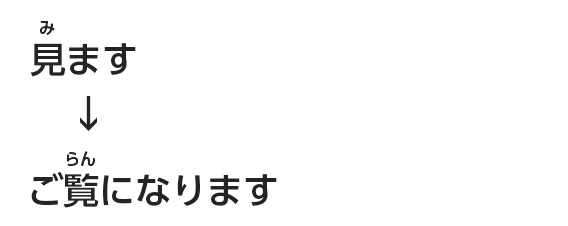Teach Us, Teacher
Honorific expressions (Lesson 38)
You use honorific expression when you are talking with, or referring to, your seniors, superiors, teachers, customers, or people you don't know well or at all. Even with the people you usually talk in a casual way, you use honorific speech, when you talk to them on formal occasions such as business meetings. The important point is where you speak.Verbs can have two categories of honorific forms. One is the "respectful form." If you use it for the verbs that express the deeds or the situations of the person you are talking with or referring to, you can show respect to this person. For example, the "respectful form" of MIMASU (to watch) is GORAN NI NARIMASU.
 The other is "the humble form." You use it, when you speak about yourself. You show your respect to the person you are talking to by using humble words when reffering to yourself. When the taxi driver in this skit meant to say "I see," he didn’t say, WAKARIMASHITA. Instead, he said KASHIKOMARIMASHITA, which is a humble way of saying "I see."
The other is "the humble form." You use it, when you speak about yourself. You show your respect to the person you are talking to by using humble words when reffering to yourself. When the taxi driver in this skit meant to say "I see," he didn’t say, WAKARIMASHITA. Instead, he said KASHIKOMARIMASHITA, which is a humble way of saying "I see."
 Honorific expressions are difficult to use even for the Japanese. So, don't worry about them too much right now. In a normal conversations, if you use the MASU form of verbs, you can sound polite enough.
Honorific expressions are difficult to use even for the Japanese. So, don't worry about them too much right now. In a normal conversations, if you use the MASU form of verbs, you can sound polite enough.